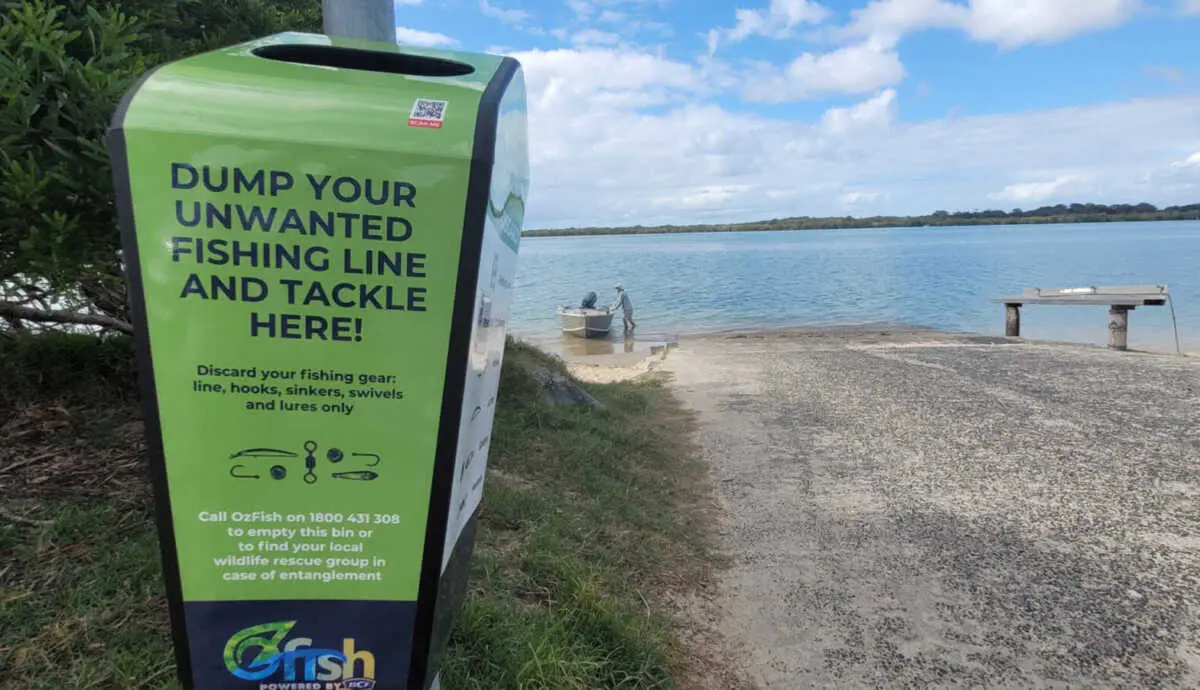Recycling Week 2024: 10 Tips for Rec Fishers

Reducing our waste, recycling materials and minimising the purchases we make can help keep our waterways, our fish and our fishing healthier, for generations to come.
OzFish CEO Cassie Price shares her 10 top tips for how recreational fishers can do their part for National Recycling Week 2024 – and beyond.
1. Join OzFish and take part in a river or beach clean-up.
As responsible fishos, we lead the way in caring for the waterways and keeping it healthy for generations to come. Join us in an event near you, to remove rubbish from the waterways you love. Any old fishing gear you collect can be recycled through our TackleLoop program.
2. Post your old tackle to our TackleLoop program.
Clean out the shed or the car boot, and send old fishing equipment to TackleLoop:
OzFish
TackleLoop
Reply Paid 91075
Ballina
NSW, 2478.
Postage is free! We accept fishing line, line spools, lures, sinkers or floats. If it can’t be repaired or renewed by our partners, it will be turned into a new product – how good is that?!
3. Become a Tangle Bin volunteer.
To make recycling fishing gear easier, OzFish is installing Tangle Bins across Australia at your favourite fishing spots. Tangle Bins are used for lines, hooks, swivels, lures, and sinkers, and to ensure they’re emptied regularly we receive help from our awesome volunteers to empty the fishing-gear bins, and send it in for recycling through TackleLoop. Interested or know a good spot for a bin? Let us know!
4. When fishing, tie good knots and use heavier gear.
This ensures less break offs and less lost lures. How confident are you at tying knots? Are you faster than your favourite fishing icon? Take the challenge online!
5. Revive your lure box and gear, instead of buying new.
A lick of paint, cleaning, and replacing hooks can make old lures as good as new again. This not only saves money but also reduces waste, giving your fishing tools a longer life and helping the environment.
6. Minimise your use of soft plastics.
Soft plastics can’t be recycled, and although they may be labelled as biodegradable, they still break down into microplastics. Plastics are very dangerous to fish as they release chemicals that can be hormone disrupters. Avoid it where you can and remember your reusable items!
7. Buy fishing gear that has the least plastic packaging.
Some brands are doing a great job of alternative packaging solutions, and the more the consumer drives the demand for plastic-free packaging, other companies will follow.
8. Select recycled plastic products, where available.
Choosing recycled plastic products supports a circular economy, reducing the demand for new plastic production and conserving resources. This helps keep plastic waste out of oceans and landfills, protecting marine life and promoting a healthier environment.
9. Choose alternatives to polystyrene floats.
Polystyrene breaks down slowly, and fragments into small, easily dispersed pieces that remain in the environment. These fragments can absorb toxic chemicals and can be ingested by marine life, leading to pollution in the food chain and long-lasting ecological harm.
10. Make your own fishing gear out of recycled materials.
You can use cork and skewers for garfish floats, old cutlery makes great lures- the opportunities are endless! This DIY approach not only reduces waste but also gives you unique, eco-friendly tools that support sustainability while fishing (and is a great conversation starter!).
The recycling work doesn’t end when the week does!
We would love your help on continuing to reduce fishing waste and litter, moving towards a circular economy. We recently received a Litter Prevention Grant from the NSW Environment Protection Authority (EPA) to reduce recreational fishing litter across NSW.
We want to make recycling easier by encouraging people to get involved in the TackleLoop program, hosting workshops to repair broken reels and rods, encouraging swaps, switching to packaging free gear, and coming together to keep our favourite fishing spots litter free.
If you are interested in getting involved, become an OzFish member and join your local chapter to work together on solutions and show the community what great work is being done!
